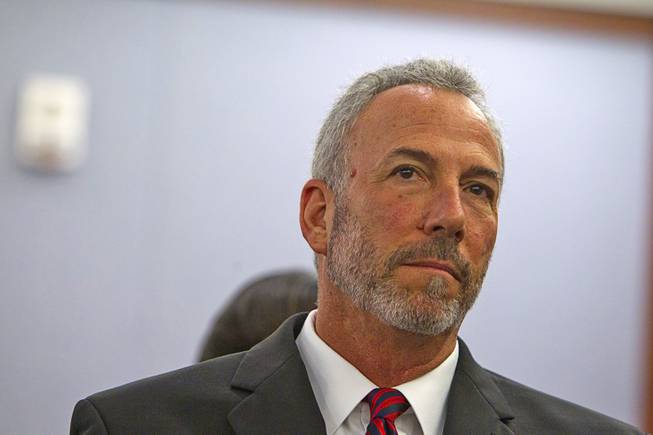
Clark County District Attorney Steve Wolfson is seeking an indictment against Metro Police officer Jesus Arevalo in the December 2011 fatal shooting of disabled veteran Stanley Gibson.
Thursday, Oct. 18, 2012 | 2 a.m.
The name sounds uppity, maybe even a little pretentious: grand jury.
The legal community tosses the phrase around with ease. After all, it rolls off the tongue smoothly — so smoothly that the Average Joe might not give it a second thought.
It’s a justice-system process shrouded in secrecy, where 17 jurors hear cases and often decide whether the evidence presented merits a trial. Aside from the jurors, only a few people are allowed to enter the proceeding, such as the district attorney, a testifying witness, an attorney accompanying a witness and an interpreter.
Nearly two weeks ago, however, the mysterious proceeding was thrust into the spotlight when authorities disclosed that Clark County District Attorney Steve Wolfson was sending a deadly officer-involved shooting case to a grand jury.
The controversial shooting resulted in the death of Stanley Gibson, a 43-year-old Gulf War veteran who was shot and killed by Metro Police officer Jesus Arevalo on Dec. 12, 2011. Gibson, whose wife said he was suffering from post-traumatic stress disorder, was unarmed at the time.
Sheriff Douglas Gillespie has condemned Wolfson’s decision, calling it a “mistake” in a video message to department employees.
Wolfson has remained mum on the reasoning behind his decision, but he sat down with a Sun reporter to explain the grand-jury process. Here’s a sampling of that discussion, edited for clarity and brevity:
What’s the purpose behind sending a case to a grand jury?
Oftentimes, (it’s) when you want to speed a case up to the district court level. Generally, cases start in justice court and then proceed to the trial court. Sometimes cases will take a long time in justice court … We feel we don’t want to wait that long to get a case moving, so we’ll take a case to the grand jury and we can get an indictment usually right away.
Sometimes, if you have certain witnesses who you don’t want to subject to a public hearing, you bring those cases before a grand jury. Sometimes sensitive cases involving sensitive topics or sensitive people will go to a grand jury, but there’s no set rule. It’s a prosecutor’s choice.
What is the role of the grand jury?
The grand jury, their role, is to determine whether there is slight or marginal evidence, which is the standard for probable cause. If they find probable cause, they indict.
An indictment, however, isn’t the only outcome of a grand jury. What’s the difference between an indictment and a presentment?
An indictment is something the prosecutor asks the grand jury to consider. A presentment is the product of the grand jury’s own deliberation. The legal effect is the same. An indictment comes out of a grand jury — criminal charge. A presentment comes out of the grand jury — criminal charge. But how it got there is different.
Prosecutors don't always ask a grand jury to consider an indictment in a case being heard. Why is that?
What if a prosecutor isn’t convinced a crime has been committed, but he feels it’s appropriate to have an investigation? And he feels it’s appropriate for the grand jury to conduct an inquiry into an event or a set of circumstances? A grand jury is a way to bring witnesses before a body of citizens so they can conduct an inquiry.
A grand jury can also issue a report about a particular case. What would a report entail?
A report can be an analysis and a fact-finding document of what happened — with criticisms of what occurred and recommendations of how a particular agency could improve. So a grand jury can issue a report without indicting or issuing a presentment. Or they can do it at the same time that an indictment or presentment is returned. The grand jury has options.
How many cases can a grand jury hear on any given day?
They could hear two or three cases in a Tuesday, four or five cases in a Tuesday or sometimes one case. It depends on the case.
Has your decision to send the Stanley Gibson case to a grand jury caused any friction between you and Metro Police?
No. I meet with the sheriff once a month. In the last month or so, we’ve sat down four or five times.

Join the Discussion:
Check this out for a full explanation of our conversion to the LiveFyre commenting system and instructions on how to sign up for an account.
Full comments policy